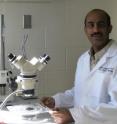In India, 1 in 25 people have gene that causes heart failure
One in 25 people from India and other south Asian countries carries a mutated gene that causes heart failure. Studying this gene, and the protein it encodes, could lead to new treatments for heart failure, Loyola University Health System researcher Sakthivel Sadayappan, PhD, wrote in a recent review article in the Journal of Molecular and Cellular Cardiology. Sadayappan has studied the gene and protein for 15 years.
Investigating the protein could provide "a better understanding of the mechanics of heart function during health and disease," Sadayappan and first author David Barefield wrote. Barefield is a graduate student and Sadayappan is an assistant professor in the Department of Cell and Molecular Physiology at Loyola University Chicago Stritch School of Medicine.
Previous studies by Sadayappan and other researchers found that about 4 percent of people who live in India, Pakistan, Sri Lanka, Indonesia and Malaysia carry the mutation. Carriers have about a 90 percent chance of developing heart failure after age 45.
About 60 million people worldwide, including about 40 million Indians, carry the mutation. (Sadayappan, who is from India, is not a carrier.) Sadayappan said the mutation likely arose in a single person roughly 33,000 years ago, and spread throughout south Asia.
The gene encodes for a protein, called cardiac myosin binding protein-C (cMyBP-C), that is critical for the normal functioning of the heart. In the mutated gene, 25 base pairs (DNA letters) are missing. As a result, the tail end of the protein is altered. Due to this modification, the protein is not properly incorporated into the functioning unit of cardiac muscle called sarcomere. Consequently, the heart does not contract properly.
In younger carriers, the heart can compensate for this defect. But as the person ages, his or her heart is no longer able to compensate. Heart muscle becomes inflamed and does not work well, a condition called cardiomyopathy. The most common manifestation of cardiomyopathy is heart failure -- the heart can't pump enough blood to the rest of the body.
There is no current treatment to prevent heart failure in people who carry the mutated gene. However, a heart-healthy diet and exercise can delay the onset of heart failure, and heart failure drugs can manage symptoms.
Sadayappan said stem cell therapy could be a possible treatment. Stem cells would be taken from a patient's heart, genetically engineered to replace the mutated gene with a healthy gene, and then injected back in the patient's heart. But such stem cell therapy has not been tested. Nor is there a commercial test for the gene, Sadayappan said.
But Sadayappan and other scientists are actively researching how cMyBP-C functions. And improved understanding of this crucial protein, Sadayappan said, could lead to new drugs to treat heart failure.
Next year is the 40th anniversary of the discovery of cMyBP-C, and scientists still have much to learn about the function of this protein in the heart. Sadayappan's lab is helping lead the way by investigating the cardiomyopathy disease mechanism that could lead to new therapies to improve muscle function in heart failure patients. His long-term goal is to continue his cutting edge laboratory research to delineate the role of cMyBP-C protein function in the heart.
Source: Loyola University Health System
Articles on the same topic
- New gene therapy proves effective in treating severe heart failureThu, 3 Jun 2010, 21:56:46 UTC
Other sources
- In India, one in 25 people have gene that causes heart failurefrom Science DailyThu, 10 Jun 2010, 3:21:10 UTC
- In India, 1 in 25 people have gene that causes heart failurefrom Biology News NetTue, 8 Jun 2010, 20:31:27 UTC
- In India, 1 in 25 people have gene that causes heart failurefrom PhysorgTue, 8 Jun 2010, 17:04:29 UTC
- New gene therapy proves effective in treating severe heart failurefrom Biology News NetSat, 5 Jun 2010, 16:50:31 UTC
- New gene therapy proves effective in treating severe heart failurefrom Science DailyFri, 4 Jun 2010, 5:30:27 UTC
- New gene therapy proves effective in treating severe heart failurefrom Science BlogThu, 3 Jun 2010, 23:00:47 UTC
- New gene therapy proves effective in treating severe heart failurefrom PhysorgThu, 3 Jun 2010, 22:31:20 UTC
- Gene therapy created for heart failurefrom UPIThu, 3 Jun 2010, 20:32:30 UTC
